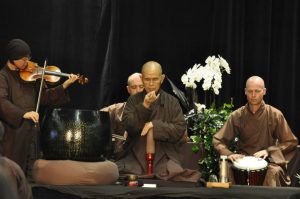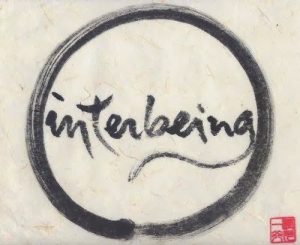[vc_column_text css=”.vc_custom_1552194422944{margin-top: 10% !important;margin-right: 10% !important;margin-bottom: 10% !important;margin-left: 10% !important;padding-top: 7% !important;padding-right: 7% !important;padding-bottom: 7% !important;padding-left: 7% !important;background-color: #96ccce !important;}”]Be open to receive others’ viewpoints, to learn throughout your entire life.
Live simply and share time, energy and material resources with those in need.
Find whatever means possible to protect life and prevent war. The concept of ‘interbeing’ comes from the Vietnamese Tiep Hien: Tiep means ‘being in touch with’ and ‘continuing’. Hien means ‘realising’ and ‘making it here and now’.
The concept of ‘interbeing’ comes from the Vietnamese Tiep Hien: Tiep means ‘being in touch with’ and ‘continuing’. Hien means ‘realising’ and ‘making it here and now’.
It is the basis of an Order of Interbeing comprising monks, nuns and lay members that the Vietnamese Zen Master, Thich Nhat Hanh, founded in 1966 in response to the violence and devastation of the Vietnamese War (1954-1975) and the need to overcome the ideological divisiveness that formed an important part of the conflict.
As Thich Nhat Hanh has said:
To be is to interbe. You cannot just be by yourself alone. You have to interbe with every other thing. The Order of Interbeing was founded in the Linji tradition of Buddhist meditative practice and emphasizes the Four Spirits: non-attachment from views, direct experimentation on the nature of interdependent origination through meditation, appropriateness, and skilful means.
The Order of Interbeing was founded in the Linji tradition of Buddhist meditative practice and emphasizes the Four Spirits: non-attachment from views, direct experimentation on the nature of interdependent origination through meditation, appropriateness, and skilful means.
Following his exile to France, Thich Nhat Hanh founded the Plum Village community, where by 2006 the Order had grown to include approximately 1000 lay practitioners and 250 monastic practitioners outside Vietnam. After Thich Nhat Hanh’s first return visit to Vietnam in 2006, the Order of Intering in Vietnam attracted hundreds of new monastic and lay members.
Interbeing takes the idea of the interdependent nature of reality that is core to the Buddhist idea of dependent origination, and makes it personal. For Thich Nhat Hanh, interbeing means being in touch with the reality of the world and the reality of the mind, through which we know the world. It means to follow in the footsteps of the Buddha, the awakened one.
To be in touch with our mind (aware) means to be aware of the processes of our inner life—feelings, perceptions, conceptualisations (thought patterns) and to uncover our inner capacity for the compassion and wisdom of the great wisdom teachers of the Buddhist tradition, a compassion and wisdom that lies at the heart of all the great spiritual traditions of human culture.
To be in touch (aware) with the reality of the world means getting out of our habitual frames of mind and limited experience and look clearly and deeply at the wonders and sufferings of life in the human, vegetal and animal realms of life around us.
The idea of realisation here and now means to bring this awareness into action in our lived experience in our actions, thoughts and relationships—right now in each present moment.Of the Fourteen Precepts of the Order of Interbeing:
- The first three precepts focus on the need to reject fanaticism and political or religious self-righteousness—issues that continue to plague the modern world.
- The fourth precept requires a commitment to not turn away but to bear witness to and engage with the suffering of others.
- The fifth precept about right livelihood focuses on the manner in which we spend our time, energy and material resources in non exploitative ways in terms of people and the natural environment.
- The sixth precept is the commitment to transform our anger and frustration into compassionate understanding of others.
- The seventh precept is to practise continuous mindful awareness of our thoughts and actions.
- The eighth to thirteenth precepts are commitments to harmonious community living and social justice through the actions of our bodies, speech and minds.
- The final fourteenth precept concerns the way we use our vital energies—to treat our own bodies and the bodies of others with respect and not as mere instruments of sexual pleasure or competitive achievement, and to care for the children whose lives we bring into being.
Reference: Thich Nhat Hanh, Interbeing: Fourteen Guidelines for Engaged Buddhism, edited by Fred Eppsteiner, Parallax Press, 1987

![Call of the Dakini | A Memoir of a Life Lived [Extract]](https://regenesis.org.au/wp-content/uploads/2023/08/Catalogue-OF-Articles-by-Barbara-Lepani-July-2018-July-2023-.jpg)
Recent Comments